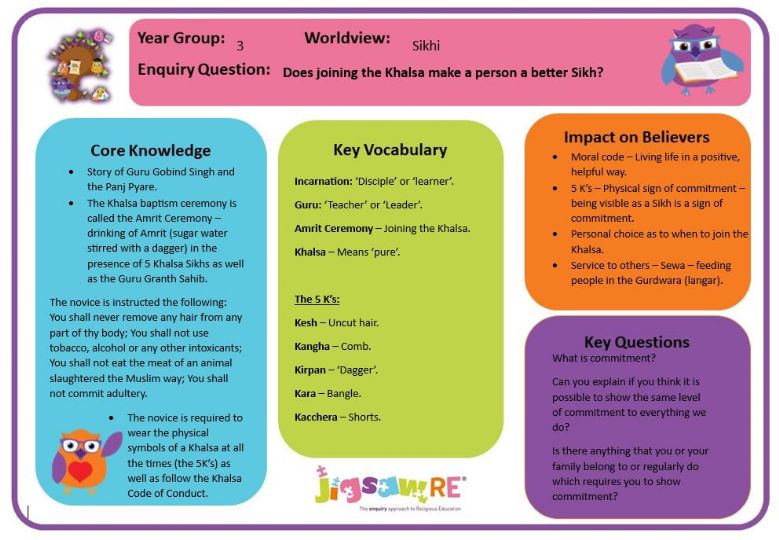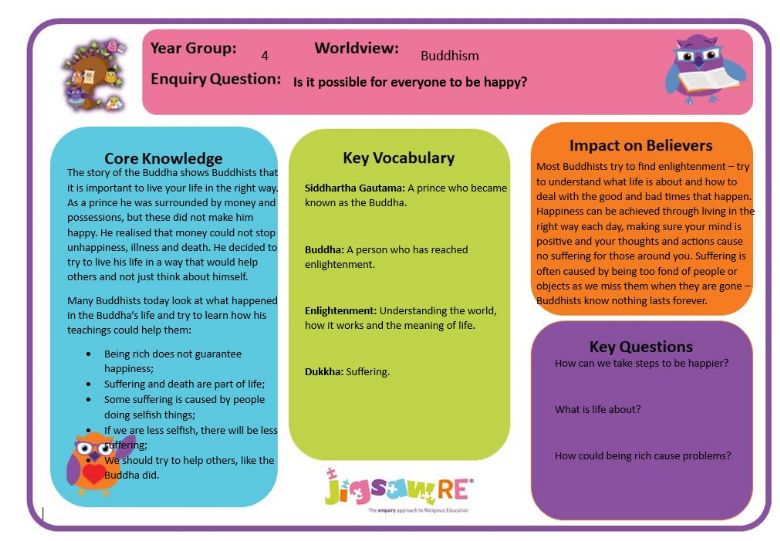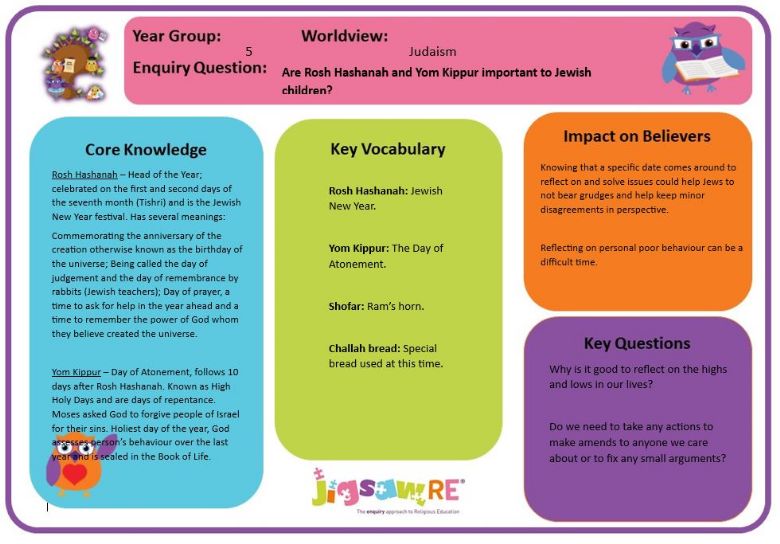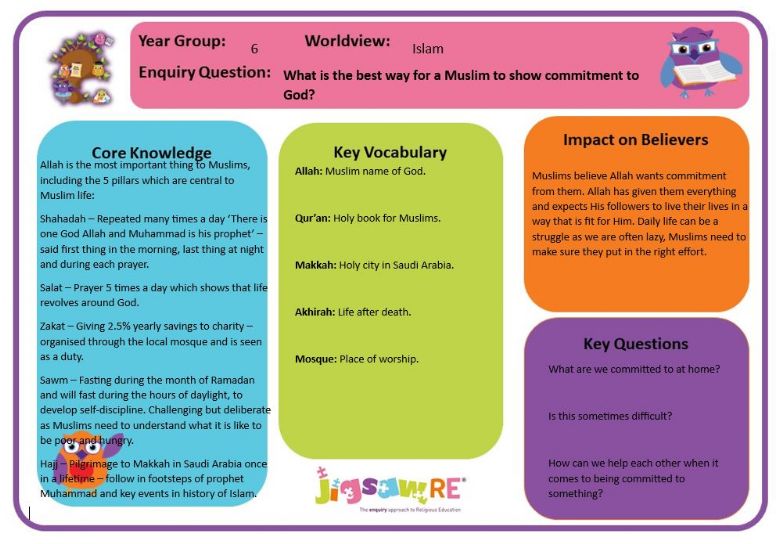2024/25
Autumn 1
At Howard Junior School, we have a dedicated day each half-term for teaching a worldview.
Year 3:
This half-term Year 3 will be studying Sikhi and will enquire: Does joining the Khalsa make someone a better Sikh? Pupils will learn that Khalsa means 'pure' and Khalsa's are Sikhs who have completed the sacred Amrit Ceremony started by Guru Gobind Singh. Pupils will learn that all Sikhs are expected to become members of the Khalsa at some point in their lives and this initiation ceremony instructs the novice:
- You shall never remove any hair from any part of thy body.
- You shall not use tobacco, alcohol or any other intoxicants.
- You shall not eat the meat of an animal slaughtered the Muslim way.
- You shall not commit adultery.
Pupils will also learn the 5K's:
- Kesh. - Uncut hair. For this reason, a turban is worn.
- Kirpan - Small sword/dagger worn only as a symbol of readiness to tackle evil and not as a weapon.
- Kara - Bangle/bracelet, a symbol to remind the wearer of restraint in their actions and to remember God at all times.
- Kangha - Wooden comb. A Khalsa is expected to regularly wash and comb their hair as a matter of hygiene and self-discipline.
- Kacchera - Shorts, a symbol of self-control and chastity.
Year 4:
This half-term Year 4 will be studying Buddhism and will enquire: Is it possible for everyone to be happy? This enquiry is based on the story of the Buddha and his three key teachings.
1. Three Universal Truths/ marks of existence:
- Dukkha (suffering)
- Anicca – the belief that nothing lasts.
- Anatta / Anatman (the belief that there is no ‘self’).
2. The Four Noble Truths:
- Dukkha (usually translated as suffering) exists – in negative events such as sickness and death, and in things that are pleasing, because the pleasure will end.
- Dukkha is caused by craving. This keeps us constantly wanting more and not being satisfied – this creates suffering.
- Dukkha can be stopped. People do not need to be greedy and selfish.
- The way to end Dukkha is by following the Noble Eightfold Path.
3. Noble Eightfold Path:
- Right Viewpoint – You should look at life in the right way.
- Right Thought - You should think about others, not just yourself.
- Right Speech – You should talk to people properly, with respect
- Right Action – You should act in a way that doesn’t hurt people.
- Right Living – Your job must help, not harm other people or animals.
- Right Effort - You should do the best that you can.
- Right Awareness - You should be sensitive to the needs of others - think about those around you.
- Right Concentration - You should focus your mind on what needs to be done - especially solving problems - Concentrate by using meditation.
Year 5:
This half-term Year 5 will be studying Judaism and will enquire: Are Rosh Hashanah and Yom Kippur important to Jewish children?
Rosh Hashanah is the Jewish Near Year Festival celebrated on the first and second of July when a horn is sounded. It is a day of prayer, a time to ask for help in the year ahead and a time to remember the power of God. This horn is not only a call to repentance, but to remember key events. Pupils will learn its meaning:
- Commemorating the anniversary of creation, otherwise known as the birthday of the universe.
- It has been called the day of judgement and the day of remembrance by the rabbis (Jewish teachers) over the years.
They will also learn of the celebrations, which include:
- Sending people good luck greetings.
- Lighting candles and reciting prayers.
- Reading the Torah (particularly stories about Abraham and his son Isaac).
- Eating a festive meal which includes Challah bread.
Yom Kippur is the Day of Atonement which follows 10 days after Rosh Hashanah. The ten days in between are known as the High Holy Days and days of repentance. This day is in remembrance of Moses asking God to forgive the people of Israel for their sins. Pupils will learn that on this day Jews will:
- Fast all day.
- Not work.
- Visit the synagogue (place of worship).
- Spend time reflecting on their own behaviour.
- Ask God for forgiveness.
Year 6:
This half-term Year 6 will be studying Islam and will enquire: What is the best way for a Muslim to show commitment to God? This enquiry considers some of the ways many Muslims show Allah that He is the most important thing in their lives. This includes the 5 pillars which are central to Muslim life and worship:
- Shahadah, from the word shahid meaning sacrifice. The Shahadah is a statement which is repeated many times a day, ‘There is one God, Allah, and Muhammad is his prophet’. This is said first thing in the morning, last thing at night and during each prayer. It is also supposed to be amongst the first words spoken to a newborn baby and last words to or a dying person if possible.
- Salat - prayer, 5 times a day. These prayers signify that life revolves around God. These times could be seen by outsiders as often inconvenient, but life fits around God, not the other way around. Praying requires the development of self-discipline. The prayer times are explained in the enquiry.
- Zakat - Giving 2.5% annual savings to charity. This is usually organised through the local mosque. Personal giving is Sadaqah. This is extra. Zakat is seen as a duty.
- Sawm - Fasting –This commemorates the giving of the Qur’an to Muhammad by Angel Gabriel. During the month of Ramadan, many Muslims will fast during the hours of daylight. This helps to develop self-discipline. It is challenging, but this is deliberate, as Muslims need to understand what it is like to be poor and hungry. Some people are exempt from fasting, including the sick, pregnant and elderly.
- Hajj – Pilgrimage to Makkah in Saudi Arabia once in a lifetime – this is to follow in the footsteps of the prophet Muhammad and commemorate some key events in the history of Islam.
Pupils will also look at other ways of showing commitment: reading the Qur’an, living a good life, helping those in need by donating to charities like Muslim Aid, attending the Mosque regularly and following the prophet Muhammad’s example.




